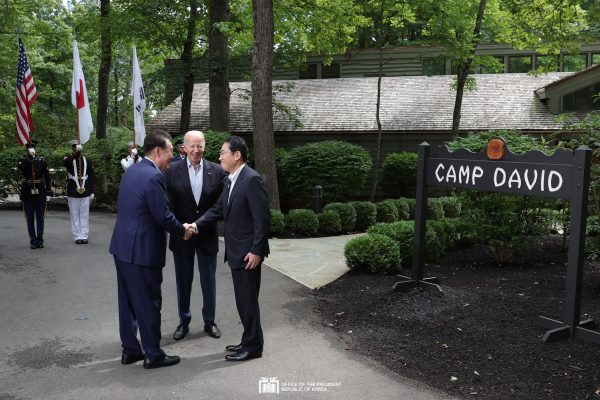Magazine
The diverging fates of two trilaterals encapsulate the latest geopolitical developments in Northeast Asia.

Credit: Office of the President, ROK
Two may be company, but three doesn’t seem like a crowd in Northeast Asia. The year 2023 saw diplomatic attempts to reintroduce trilateralism as the basis of regional cooperation. The August 2023 Camp David summit, hailed as historic for it marked the beginning of the institutionalization of Japan-South Korea-U.S. (or JKU) trilateral ties, took center stage in East Asian international relations. Its supposed rival triad, the China-Japan-South Korea summit, failed to take place as Beijing snubbed Seoul.
Trilateralism in Northeast Asia involving the United States or China isn’t entirely new. Still, the Camp David summit introduced a new variable that will likely reconfigure regional dynamics – Washington’s apparent willingness to engage the region more actively. The enthusiasm for this new “clique” is also seemingly shared by Japan and South Korea, both long-time U.S. security allies.
The belated emergence of JKU trilateralism is puzzling as the three have shared common security concerns regarding North Korea since the 1990s, raising eyebrows as to whether South Korean leader Yoon Suk-yeol’s approval ratings were the driving force. The U.S. initiated the trilateral, yet it wouldn’t have been possible without Yoon risking his political cachet and mending ties with Japan. At the same time, South Korea’s pursuit of strengthening trilateral cooperation with Japan and the U.S. was done at the expense of its relations with China.
Japan-South Korea-U.S. Trilateralism: A Precursor to an Asian NATO?
The Camp David summit in August 2023 was historic and significant in many ways, especially given the humble beginning of JKU trilateral summitry. Born out of security considerations in the 1990s as North Korea resisted the U.S. unipolar moment by embarking on a nuclear venture, the JKU summits have been restricted to practicality rather than grand symbolism. Since the 1990s, JKU leaders met on the sidelines of multilateral summits like the APEC summit and the United Nations General Assembly for consultation purposes, usually driven by necessity related to North Korea’s nuclear program. Pragmatism made the meetings vulnerable to two-way diplomatic tensions, such as in 2014 when Japan-South Korea bilateral spats over history posed a potential obstacle to a three-way summit.
JKU trilateralism offered a convenient venue for the United States to implement its blueprint for engagement with East Asia, as summarized in its Indo-Pacific strategy released in February 2022. As the strategy crystalized in the first year of the Biden administration, the United States formed another security trilateral in the region. Known as AUKUS (Australia-U.K.-U.S.), this trans-Pacific and trans-Atlantic trilateralism indicated an evolving regional security landscape. It hinted at a shift from the Cold War-era “hub-and-spoke” approach to a network of minilateral security partnerships with the United States as a primary node and Europe, or NATO in particular, as offshore support. Forming multiple minilateral partnerships spanning the Pacific and Atlantic Oceans would lessen the burden of hedging between the U.S. and China by East Asian states while allowing Washington to draw on the existing military and diplomatic capital embedded in its ties with European NATO allies.
